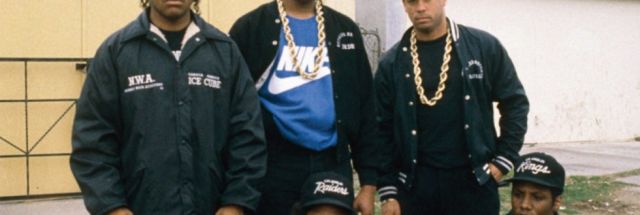
Front page layout
Site theme
Annalee Newitz –
If you saw a trailer for Straight Outta Compton on Facebook, it was targeted at you based on your race—or, at least, based on what Facebook thinks is your race. People identified by the company as white, black, or Hispanic were shown different versions of the trailer. This is part of Facebook’s new “ethnic affiliation” marketing, which effectively resembles racial profiling with a big data advertising twist.
Universal digital marketing exec Doug Neil described the race-based marketing for Straight Outta Compton at South by Southwest. Business Insider sums it up:
Neil credited part of [the film’s success] to a specialized Facebook marketing effort led by Universal’s “multicultural team” in conjunction with its Facebook team. They created tailored trailers for different segments of the population….The “general population” (non-African American, non-Hispanic) wasn’t familiar with N.W.A., or with the musical catalog of Ice Cube and Dr. Dre, according to Neil. They connected to Ice Cube as an actor and Dr. Dre as the face of Beats, he said. The trailer marketed to them on Facebook had no mention of N.W.A. but sold the movie as a story of the rise of Ice Cube and Dr. Dre.
The trailer marketed to African Americans was completely different. Universal assumed this segment of the population had a baseline familiarity with N.W.A. “They put Compton on the map,” Neil said. This trailer opens with the word N.W.A. and continues to lean on it heavily throughout.
The two trailers aren’t just mildly different—they look like they’re advertising two completely different films. The version for white users, below, comes across like a gangster movie. It emphasizes the violence of the group, showing them brandishing semi-automatics, clashing with police, and walking through what appear to be riots. We only see the actors without seeing any of the actual members of N.W.A. who appear in the film. It looks like a scripted drama and not a biography of real people.
But the version of the trailer for black users, below, plainly depicts the film as a biography. We see members of N.W.A. talking about how their music was “protest art” that reflected the horrible conditions in LA ghettos of the 1980s. A quiet ripple of music swells behind them as they talk to people about what N.W.A. meant to them, and the movie comes across as a reverent retelling of how these important African American artists rose to fame. We don’t see any violence until over a minute into the trailer, after it has been contextualized as “protest” imagery created by the very relatable, beloved members of N.W.A.
Facebook has been pushing its “ethnic affinity” targeting since late 2014, courting advertisers who want to deliver ads just to the Hispanic community, for example, or who want to create separate campaigns for, say, white users versus Asian American users. Facebook currently offers advertisers four ethnic demographics: non-multicultural (presumably meaning white users), African American, Asian American, and Hispanic. For advertisers interested in multicultural marketing, Facebook offers a quick tutorial in what multicultural affinity groups are and why an advertiser might want to reach them.
In the tutorial, Facebook is careful to avoid terminology that makes it appear that the company is in fact doing racial or ethnic targeting, even though the service is called “ethnic affinity” targeting:
The diversity of the US is more than an ethnic biodiversity. These groups of people have a rich diversity of culture, which can include many things, such as beliefs, traditions, music, aesthetics, or language. The people in the US who have demonstrated affinity for the cultures of these groups make up the US Multicultural Affinity audiences.
The word “affinity” can generally be defined as a relationship like a marriage, as a natural liking, and as a similarity of characteristics. We are using the term “Multicultural Affinity” to describe the quality of people who are interested in and likely to respond well to multicultural content. What we are referring to in these affinity groups is not their genetic makeup, but their affinity to the cultures they are interested in.
The Facebook multicultural targeting solution is based on affinity, not ethnicity. This provides advertisers with an opportunity to serve highly relevant ad content to affinity-based audiences.
Facebook carefully describes ethnicity as “affinities… a similarity of characteristics” and not “genetic” (even though race isn’t genetic, either). But Facebook’s descriptions make it obvious that this is about marketing to racial groups, not people who share “a natural liking.” Each group is described next to pictures that show members of the target race rather than random people simply engaging in cultural activities associated with “beliefs, traditions, music, aesthetics, or language.”
In a screenshot of the tool shown below, “ethnic affinity” is listed as a “demographic,” a term that is generally used to describe factual information about a person, like income level, race, and age. For something like affiliation, which Facebook claims is based on cultural interests and feelings, marketers would typically use the term “psychographic.” But the circumstantial evidence—as well as plain old common sense—suggests that this tool is aimed at targeting certain ads at people based on their race or ethnicity.
Given that Facebook users are not required to list a racial or ethnic identity in their profiles, how does Facebook piece together a person’s “affinities?” At South by Southwest, Facebook entertainment exec Jim Underwood gave the audience a taste of what goes into the company’s classification system. Business Insider explains:
To construct an “African American affinity segment,” Facebook would look at indicators like whether someone was a member of an African American Chamber of Commerce Facebook group. When many of these indicators are taken into account simultaneously, it allows Facebook to define the “affinity” segment.
So even if you don’t give Facebook your race or ethnic identity, the company is still using everything else you tell it to figure that ethnic identity out—including your interests, your friends, and the organizations you say you belong to. This is a pretty typical “big data” problem, but there are limits to its effectiveness. A black person who speaks Japanese and goes to anime conventions, for example, might get pegged as Asian American. A white person who likes gangster rap might have gotten the “black” ad for Straight Outta Compton. As Clover Hope remarks wryly over at Jezebel, this kind of affiliation marketing means that Rachel Dolezal—the white woman who passed as a black woman and became a local NAACP leader—would probably have gotten the version of the Straight Outta Compton trailer targeted toward a black audience.
Now that Facebook is building up information on the racial identities of its users, there’s one obvious question: Will anyone other than marketers be interested in that data?
Join the Ars Orbital Transmission mailing list to get weekly updates delivered to your inbox. Sign me up →
CNMN Collection
WIRED Media Group
© 2024 Condé Nast. All rights reserved. Use of and/or registration on any portion of this site constitutes acceptance of our User Agreement (updated 1/1/20) and Privacy Policy and Cookie Statement (updated 1/1/20) and Ars Technica Addendum (effective 8/21/2018). Ars may earn compensation on sales from links on this site. Read our affiliate link policy.
Your California Privacy Rights |  Do Not Sell My Personal Information
Do Not Sell My Personal Information
The material on this site may not be reproduced, distributed, transmitted, cached or otherwise used, except with the prior written permission of Condé Nast.
Ad Choices
